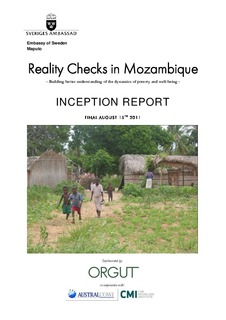Reality checks in Mozambique. Inception report.
Tvedten, Inge; Tuominen, Minna; Rosário, Carmeliza; Paulo, Margarida; Faquir, Sheila; Picardo, Rachi
Research report
Permanent lenke
http://hdl.handle.net/11250/2475424Utgivelsesdato
2011-08-01Metadata
Vis full innførselSamlinger
- Publications [1488]
Originalversjon
Stockholm/Maputo: Sida/Swedish EmbassySammendrag
Poverty monitoring in Mozambique primarily takes place within the framework of the implementation of Mozambique’s Poverty Reduction Strategy (PARPA), and is informed by quantitative data derived from different types of national surveys and similar types of studies done by aid organisations. However, by their quantitative nature such surveys do not capture all the dimensions of poverty that are relevant to the design of policies and programmes. While quantitative data yield valuable information about the mapping and profile of poverty over space and time, qualitative data are necessary in order to better understand the dynamics of poverty and the coping strategies of the poor. Against this background, the Swedish International Development Authority (SIDA) has decided that there is a need to assess the impact of development and poverty reduction policies ‘from below’, and to regularly consult local populations in order to understand local processes and relationships. A series of five “Reality Checks” will take place in the period 2011-2016 focussing on the dynamics of poverty and well-being, with a particular focus on good governance, agriculture/climate and energy that are key sectors in Swedish development cooperation with Mozambique. More concretely, the “Reality Checks in Mozambique” are expected to: i) Inform the public discussion among key development actors on poverty reduction, especially in the province of Niassa; ii) contribute to a better understanding of qualitative poverty monitoring methods in Mozambique; and iii) provide Sweden with relevant qualitative data on developments and results from its engagement in Mozambique and support further implementation of its programme in Niassa. The project is led and coordinated by Orgut Consulting in Sweden, and will be carried out by a team of six researchers and three thematic advisors with Dr. Inge Tvedten from CMI as team-leader. Inc
